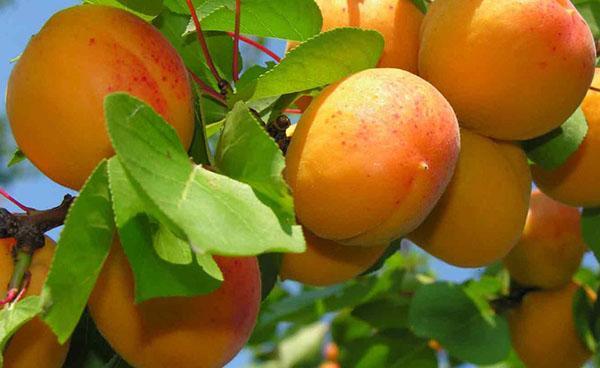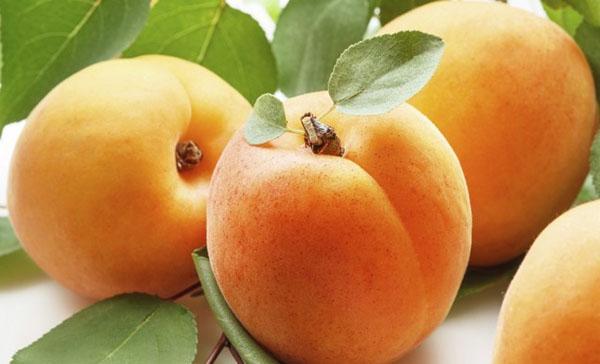Composition and medicinal properties of apricot for human health
 These bright sugar fruits, wonderfully quenching thirst and hunger, are known anywhere in the world. Somewhere they are sold as exotic fruits, someone grows them at their summer cottage. The medicinal properties of apricot are striking in their variety. In truth, there is not a single culture on earth that does not benefit the human body. But this fruit requires special attention.
These bright sugar fruits, wonderfully quenching thirst and hunger, are known anywhere in the world. Somewhere they are sold as exotic fruits, someone grows them at their summer cottage. The medicinal properties of apricot are striking in their variety. In truth, there is not a single culture on earth that does not benefit the human body. But this fruit requires special attention.
Read the article in the topic: recipe jam from apricot slices.

Description and chemical composition of the product
 According to some scholars, Armenia or Tien Shan is the homeland of this fruit tree. Today, it grows in many areas with warm climates and produces bountiful harvests. The tree miraculously tolerates dry times and severe frosts up to 30 degrees.
According to some scholars, Armenia or Tien Shan is the homeland of this fruit tree. Today, it grows in many areas with warm climates and produces bountiful harvests. The tree miraculously tolerates dry times and severe frosts up to 30 degrees.
The apricot fruit has a rounded shape and comes in the following colors:
- Orange;
- citric;
- yellow;
- with pinkish barrels.
It is used in food raw and dried. Canning: compotes, jam, jam, jam, which practically does not affect the beneficial properties of apricot.
In some areas, the kernels of the seeds of ripe fruits are especially appreciated, which are widely used in cooking.
 Deep research of the plant has shown that it contains a huge number of valuable elements:
Deep research of the plant has shown that it contains a huge number of valuable elements:
- flanoids (bark, wood);
- ascorbic, phenolcarboxylic acid (leaves);
- carotene (inflorescences);
- vitamins A, B, PP, C, H, E (fruits).
In addition, the medicinal properties of apricot are due to the presence of such trace elements in fruits:
- sodium;
- potassium;
- iron;
- fluorine;
- chromium;
- sulfur;
- magnesium;
- phosphorus;
- calcium;
- iodine;
- manganese;
- molybdenum;
- zinc;
- vanadium;
- nickel.
 The presence of a large amount of carotene in the pulp of the fruit indicates the brightness of the color. It also contains a number of acids:
The presence of a large amount of carotene in the pulp of the fruit indicates the brightness of the color. It also contains a number of acids:
- apple;
- wine;
- lemon.
 And in the core of the bone, proteins, essential oils and organic acids were found. Having studied these elements, scientists have appreciated the medicinal properties of apricot, which have a beneficial effect on the body. Ibn Sina, an oriental healer with a worldwide reputation, advised to consume the fruit in large quantities during its ripening. The reason is hair shine, strong nails, skin rejuvenation. In those days, the pulp was applied to the body to get rid of the unpleasant smell of sweat. And decoctions were used to treat the intestines and respiratory organs. Modern scholars fully agree with the research of the ancient sages.
And in the core of the bone, proteins, essential oils and organic acids were found. Having studied these elements, scientists have appreciated the medicinal properties of apricot, which have a beneficial effect on the body. Ibn Sina, an oriental healer with a worldwide reputation, advised to consume the fruit in large quantities during its ripening. The reason is hair shine, strong nails, skin rejuvenation. In those days, the pulp was applied to the body to get rid of the unpleasant smell of sweat. And decoctions were used to treat the intestines and respiratory organs. Modern scholars fully agree with the research of the ancient sages.
According to nutritionists, you should not get carried away with the seeds of ripe apricots. They contain hydrocyanic acid, which can cause food poisoning.
Medicinal properties of apricot: facts and evidence
An amazing tree with a lush crown has attracted attention since ancient times. To treat various ailments, healers used ripe fruits, bark and leaves.Through careful observation, they noticed a positive effect on the body of the components of the wonderful tree. Therefore, they well understood what apricot is good for, and how it is better to take it.
Bark
 Research by modern biologists has shown that apricot bark contains a substance that resembles "Piracetam" - a drug for the treatment of the heart and central nervous system. Based on this, a decoction from the bark of an apricot tree is prescribed for the recovery of patients after strokes. The tool helps women who have undergone difficult childbirth to return to their normal state of life.
Research by modern biologists has shown that apricot bark contains a substance that resembles "Piracetam" - a drug for the treatment of the heart and central nervous system. Based on this, a decoction from the bark of an apricot tree is prescribed for the recovery of patients after strokes. The tool helps women who have undergone difficult childbirth to return to their normal state of life.
Often, resin droplets appear on the surface of the apricot bark. This gooey liquid is used to treat the stomach as it relieves inflammation and pain.
Leaves
 It is important to consider the beneficial properties and contraindications of apricot leaves in order to have a balanced approach to treatment methods. Various types of decoctions are used to cleanse the body of all kinds of toxins. It is especially effective to take them to people who work in such unfavorable conditions:
It is important to consider the beneficial properties and contraindications of apricot leaves in order to have a balanced approach to treatment methods. Various types of decoctions are used to cleanse the body of all kinds of toxins. It is especially effective to take them to people who work in such unfavorable conditions:
- zone of increased radiation;
- chemical industry;
- work with textiles;
- polygraphy.
Apricot leaves filled with boiling water are taken as a diuretic by people suffering from kidney diseases. And the tincture will help get rid of helminths.
You can get rid of unpleasant odors and plaque by chewing a leaf plate of fruit for 5 minutes.
Like any medicinal plant, apricot leaves are contraindicated for people who are sensitive to the components of the product. If any deviations occur, you should immediately stop taking tinctures and decoctions of the drug.
Flowers
 In early spring, when the garden is still dormant, the apricots are the first to bloom. Delicate inflorescences with a pinkish tinge abundantly cover the graceful trees. A truly stately beauty, but not only! The beneficial properties of apricot flowers have been known to more than one generation of traditional healers. Various decoctions, tinctures, compresses are prepared from the buds, which are used as a hemostatic agent.
In early spring, when the garden is still dormant, the apricots are the first to bloom. Delicate inflorescences with a pinkish tinge abundantly cover the graceful trees. A truly stately beauty, but not only! The beneficial properties of apricot flowers have been known to more than one generation of traditional healers. Various decoctions, tinctures, compresses are prepared from the buds, which are used as a hemostatic agent.
The main condition is consultation with the attending physician and dosage.
Possible contraindications
 Unfortunately, for some people, the saying applies: "Not all that glitters is gold." Therefore, they have to take into account not only the beneficial properties of apricot, but also contraindications. This is especially true for people suffering from such diseases:
Unfortunately, for some people, the saying applies: "Not all that glitters is gold." Therefore, they have to take into account not only the beneficial properties of apricot, but also contraindications. This is especially true for people suffering from such diseases:
- pancreatitis;
- hepatitis;
- diabetes;
- nodes on the thyroid gland.
The elements that make up the fetus (carotene, retinol) are not absorbed by the body, therefore a failure occurs. In addition, the consumption of large amounts of seeds leads to nausea, weakness, intestinal upset and even loss of consciousness of a completely healthy person.
Sun Fruit and Outward Beauty
 According to experts, the use of apricot in cosmetology has brought invaluable benefits to the inhabitants of the planet. Elements from these fruits are used to create various creams, masks, lotions and shampoos. To do this, extracts are made from such parts of the fruit:
According to experts, the use of apricot in cosmetology has brought invaluable benefits to the inhabitants of the planet. Elements from these fruits are used to create various creams, masks, lotions and shampoos. To do this, extracts are made from such parts of the fruit:
- fruit kernel kernels;
- pulp;
- bark;
- leaves.
Even fresh apricot is good for the skin if it is thoroughly crushed and applied to a washed face as a mask. As a result, it will become elastic, velvety and tender.
Before applying the gruel to your face, you should determine your skin type in order to properly mix the ingredients. Otherwise, the procedure will not be beneficial.
Extensive use of wood
 Over the centuries, craftsmen have looked for suitable materials for making decorative items. The use of apricot wood became the greatest event in folk craft, when wonderful household items were made from it:
Over the centuries, craftsmen have looked for suitable materials for making decorative items. The use of apricot wood became the greatest event in folk craft, when wonderful household items were made from it:
- boxes;
- canes;
- wall panels;
- kitchen sets;
- pendants;
- brooches;
- ladles;
- glasses.
 All these items are durable, beautiful and practical to use.To this day, they are especially popular among the rural population of the Slavic peoples.
All these items are durable, beautiful and practical to use.To this day, they are especially popular among the rural population of the Slavic peoples.  In addition, apricot wood is considered a wonderful fuel.
In addition, apricot wood is considered a wonderful fuel.  It is used for cooking kebabs, barbecues and tourist porridge. Dishes come out with an excellent scent of sweet fruit tree.
It is used for cooking kebabs, barbecues and tourist porridge. Dishes come out with an excellent scent of sweet fruit tree.